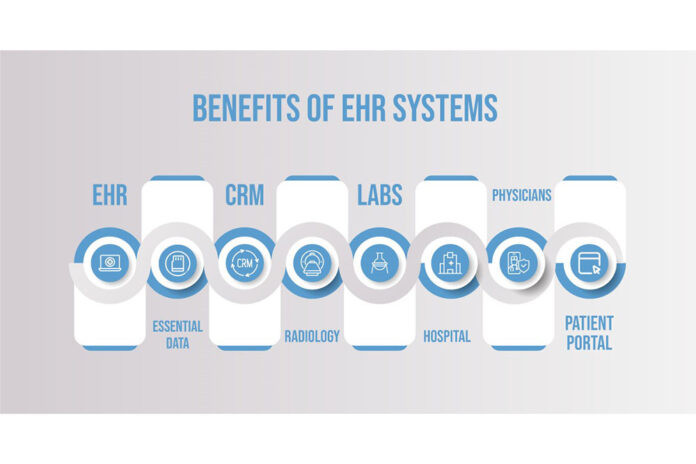Electronic Health Record (EHR) systems are essential to modern healthcare practices. They have gained importance over the past several years as a result of the growing demand for better patient care, increasing regulatory requirements, and the need for more efficient healthcare delivery.
EHR systems are essential for enhancing patient care, boosting productivity, enabling communication, and assuring legal compliance. Investment in the correct EHR system can help medical practices reap significant rewards and maintain their competitiveness in the continuously changing healthcare industry.
In this article, some of the most popular EHR platforms—including Epic, Cerner EMR, Allscripts, Meditech, Athenahealth, EClinicalWorks, and NextGen Office EHR—will be briefly discussed. We shall examine the main benefits and features of this software. You will be better prepared to select the ideal EHR system for your practice or business once you have finished reading this article and have a better understanding of the EHR market.
How to choose the best Electronic Health Record (EHR) system
It can be difficult to choose the finest electronic health record (EHR) system for your medical business. With so many options on the market, it’s crucial to carefully assess your wants and requirements to make sure you choose a system that satisfies them. The following advice will help you select the ideal EHR system:
Evaluate Your Needs and Requirements
Prior to comparing EHR systems, it’s critical to determine your demands and specifications. Take into account your practice’s size and scope, the patients you encounter, and the particular workflows and procedures that are crucial to your business. Also, think about the kinds of statistics and reporting you require to manage your practice successfully.
Look for a System That is Easy to Use
The simplicity of use should be one of your top priorities when selecting an EHR system. The interface should be well-designed and simple to use, and the system should be intuitive and user-friendly. Choose a system that enables you to alter workflows to meet the requirements of your practice.
Consider the System’s Features and Functionality
Consider the features and functionality of the EHR system. Look for a system that provides
- Comprehensive patient charts,
- Medication management tools,
- Lab and imaging integration, and
- Billing and scheduling capabilities.
Additionally, consider whether the system is compatible with mobile devices and whether it includes features such as patient portals and telemedicine capabilities.
Ensure the System is Compliant with Regulations
It is essential to choose an EHR system that complies with the regulations and standards set by the Health Insurance Portability and Accountability Act (HIPAA). Additionally, consider whether the system meets other regulatory requirements, such as those set by the Centers for Medicare & Medicaid Services (CMS).
Evaluate the Vendor’s Reputation and Support
Choose an EHR vendor with a good industry reputation and a track record of providing reliable and responsive support. Look for a vendor that provides ongoing training and support and offers a robust user community and knowledge base.
Consider the Total Cost of Ownership
When evaluating EHR systems, consider the total cost of ownership, including both the upfront costs and ongoing maintenance and support fees. Consider whether the vendor offers a flexible pricing model that fits your budget and whether the system provides a good return on investment.
In conclusion, choosing the best EHR system for your practice requires careful evaluation of your needs and requirements, ease of use, features and functionality, compliance with regulations, vendor reputation and support, and total cost of ownership. By considering these factors, you can select an EHR system that meets your specific needs and provides the best possible value for your practice.
Which EHR Software is Currently Preferred by the Majority of Healthcare Practitioners?
There are several top and famous electronic health record (EHR) systems available on the market today.
Here’s a comparison of some of the most popular ones:
Epic
Epic is one of the largest and most widely used EHR systems. It is known for its scalability and customization options, which make it suitable for large healthcare organizations. It is also highly rated for its patient portal and interoperability capabilities.
Cerner
Another well-known EHR system that provides a variety of features and modules is Cerner. It is renowned for having an intuitive user interface and extensive clinical decision assistance features. Also, it receives good marks for its population health management and interoperability abilities.
Allscripts
Allscripts is a popular EHR system that offers a range of solutions for small to medium-sized practices. It is well regarded for being flexible and simple to use, making it appropriate for practices with a range of demands. It also gets good marks for managing population health and engaging patients.
Meditech
Meditech is an EHR system that offers comprehensive solutions for both acute and ambulatory care settings. It is known for its ease of use and interoperability capabilities, which make it suitable for healthcare organizations of all sizes. It is also highly rated for its clinical decision support and patient engagement capabilities.
Athenahealth
Athenahealth is a cloud-based EHR system known for its ease of use and accessibility. It offers electronic prescribing, patient portals, and automated appointment reminders.
EClinicalWorks
eClinicalWorks EHR is used by over 130,000 healthcare providers in the US. The eClinicalWorks EHR offers a wide range of features, including electronic prescribing, medical billing, patient scheduling, and patient engagement tools. The company also offers population health management solutions, telehealth, and revenue cycle management services.
NextGen Office EHR
NextGen Office EHR is designed for small to mid-sized medical practices, and the NextGen Enterprise EHR is designed for larger healthcare organizations. NextGen Healthcare offers practice management software, patient engagement tools, and revenue cycle management solutions.
Conclusion
Overall, each of these EHR systems has its strengths and weaknesses. When choosing EHR software. Evaluating your specific needs and comparing different options is crucial to finding the right system that aligns with your requirements. Insights regarding the effectiveness and usability of various EHR systems can also be gained by consulting experts and asking users for their opinions. You can get advice and support from Software Finder to select the best choice for your practice. For further detail, visit the Software Finder website.
Read Also
- Management Reinforcement for Healthcare Providers in a Shifting SystemHealthcare is changing faster than ever. So, providers are feeling the pressure to keep up. New technology, changing patient needs, and constant rule updates make it tough for managers to stay on top. Strong leadership helps teams work better, give great care, and stay happy in their jobs. Here’s how healthcare leaders can strengthen their… Read more: Management Reinforcement for Healthcare Providers in a Shifting System
- Why Effective Disinfection Remains the Foundation of Public HealthFrom hospitals and schools to transport hubs and food production sites, disinfection is central to breaking the chain of infection and protecting community health. The COVID-19 pandemic highlighted how crucial surface hygiene and environmental control are in reducing the spread of harmful microorganisms. Yet, beyond emergency response, routine and validated disinfection practices remain the cornerstone… Read more: Why Effective Disinfection Remains the Foundation of Public Health
- How to Navigate Your Medical Assistant Career PathBecoming a medical assistant can feel both exciting and a little stressful. This job lets you work closely with doctors and other healthcare workers to help patients. But with so many different paths to take, it can be hard to know where to start or how to plan your career. Wouldn’t it be nice to… Read more: How to Navigate Your Medical Assistant Career Path
- Benefits of Enrolling in Botox Training CoursesMany people want to enhance their skills in the beauty field, and one way to do that is through Botox training. With the rising popularity of Botox, enrolling in training courses can set you on a path to a rewarding career. If you are considering this option, you might be curious about the benefits that… Read more: Benefits of Enrolling in Botox Training Courses
- How Pilates Certification Enhances Professional Growth in HealthcareAre you looking for a way to expand your skills and stand out in healthcare? Pilates certification can be a powerful step in your professional journey. It not only helps you understand movement and body mechanics. It also gives you tools to support patient recovery. It also improves mobility, and promotes wellness. Ready to see… Read more: How Pilates Certification Enhances Professional Growth in Healthcare
- Understanding the Legality & Challenges in the Dental Aligner IndustryThe dental aligner industry has grown quickly in the past decade. More people are choosing clear aligners instead of traditional braces because they are less noticeable and often more convenient. While this growth has created new opportunities, it has also raised legal questions and practical challenges. Patients, dentists, and companies are still learning how to… Read more: Understanding the Legality & Challenges in the Dental Aligner Industry







